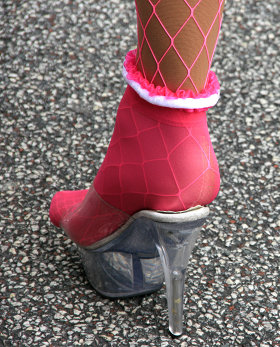The EU claims to safeguard women’s rights. In fact it bolsters sex tourism, failing to rectify policies that have gone awry. British “lads” in Prague are one example.
The myth of gender equality in the EU

I’m sitting on a plane from London to Prague, listening to the playful banter of a group of young British “lads.” Dressed in matching t-shirts with amusing nicknames on the back, they call out to each other excitedly. One holds up a magazine with a photo of a topless woman – the others roar with laughter. I’m so proud to see my countrymen behaving so charmingly, and sad to think that during my stay in Prague, I probably won’t see them again. After all, these groups of Brits generally spend their days in the “English Pub” on Old Town Square, where they can eat bangers and mash and feel quite at home – and by all accounts, they spend their nights in brothels.
Across Eastern Europe, similar groups of pleasure-seekers are arriving in medieval towns and entertaining the inhabitants with their quaint inability to speak any language other than Laddish, and their picturesque tradition of urinating on Baroque churches and Neoclassical fountains to show their appreciation of foreign cultures. I’m always happy to see that when I meet a Czech, or a Pole, or a Lithuanian, our famous ambassadors of British etiquette are often the first thing they think of when I tell them I’m from England. And it’s nice to think that our boys are doing Eastern Europe a favour by supporting the sex trade, even in these troubled economic times.
One on-going problem with the myth of gender equality in the EU is that gender policy has consistently focussed on the jobs market.
In fact, the well-known phenomenon of matching-t-shirted drunken sex tourists is an example of the complicated failure of the EU to practise what it preaches when it comes to gender. Political scientist Heather Macrae explains the reasons in her article The EU as a Gender Equal Polity: Myths and Realities. During the 1990s, the Commission gradually deregulated the airline industry, with the result that cheap flights began to buzz to and fro across the continent – and when countries such as the Czech Republic and Lithuania joined the EU, this legislation automatically applied to them too. The deregulation process has been reviewed several times since – with regard to its environmental impact, for instance – but although prostitution has increased in several cities because of the flood of cheap flights, this aspect of the issue has not been investigated by the Commission. And so a type of tourism which blatantly glories in the commodification of the female body has actually been encouraged by an EU in which, according to its own PR, “the meaning of gender equality … has evolved well beyond the pay gap to encompass work-life balance, the eradication of violence against women and girls, the suppression of human trafficking…”
EU “gender mainstreaming”
The myth of gender equality is important to the EU’s image. It is presented as a founding myth, with emphasis on the fact that the Treaty of Rome in 1957 required equal pay for equal work in all member states. And the Commission is eager to show that gender equality is still an essential principle in the EU’s current activities – that the Commission promotes equality both through direct legislation and through “gender mainstreaming,” which means that policies apparently unrelated to gender are evaluated as to their possible gender impact.
Even where the EU does act legislatively to bolster equality, the individual member states often manage to undermine this.
One on-going problem with the myth of gender equality in the EU is that gender policy has consistently focussed on the jobs market, and has more than once been used as an attractive way to dress up policies which were actually aimed at fostering competition rather than promoting gender equality. But the focus on equality in employment has a knock-on effect: it narrows the entire concept of gender equality within the EU. And in any case, the myth of the EU as a place where women and men are equal is not very strongly engrained in the minds of EU citizens or their national politicians. This means that the EU version of gender equality, which assumes that both women and men have the same capabilities and should be equally enabled to work, to look after their children, to return to work after having children, and so on, often clashes with stronger and more deeply rooted national myths which see women as homemakers, for instance. As Heather Macrae points out in her article, it took years for Germany to implement EU legislation on maternity and paternity properly. Initially, the EU rules were interpreted in a way which encouraged women to stay at home and look after the children, reflecting German traditions. So even where the EU does act legislatively to bolster equality, the individual member states often manage to undermine this.
Rhetorical policy-making

The weakest point of the myth becomes clear when we look at policy areas other than employment and welfare. Here the concept of “gender mainstreaming” is supposed to ensure that policy makers consider the gender impact of legislation. But so far, this hasn’t really worked: in order for a policy to be scrutinised in this way, it has to answer specific criteria – “Does the proposal concern one or more target groups? Will it affect the daily life of part(s) of the population? Are there differences between women and men in this policy field (with regard to rights, resources, participation, values and norms relating to gender)?” Policies with a complex, indirect effect on gender relations, such as the deregulation of airlines, are unlikely to be investigated. Perhaps it’s understandable that no one foresaw the consequences of deregulation for sex tourism, but the fact that these consequences still haven’t been seriously examined shows that the EU’s presentation of itself as a bastion of gender equality is more rhetorical than real.
Visiting a brothel? Socially accepted.
I recently found myself – slightly against my will – discussing women’s rights with a young Czech guy in Prague. He evidently found it a bit ridiculous that I was bothered about gender inequality in Europe, when there are women in Middle Eastern countries being stoned to death for committing adultery. In some ways, he’s right – I’m sure that as a privileged young European I do have a tendency to moan about trivial inequalities. However, I’d have thought that a prostitute on a Prague street corner would probably say that we do have a problem – and I’m afraid to imagine her thoughts as she hears the drunken laughter of yet another group of “lads” approaching. Their laughter is confident, smug – because they know that their behaviour is socially accepted and even tacitly encouraged by economic conditions across the EU. It’s become part of our everyday lives – and while we live like this, we can’t expect to be taken all that seriously when we condemn the “misogynist” attitudes which prevail in other parts of the world.
Cover photo: Jose Pereira (flickr), Licence: CC BY-ND 2.0









